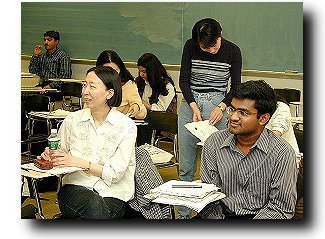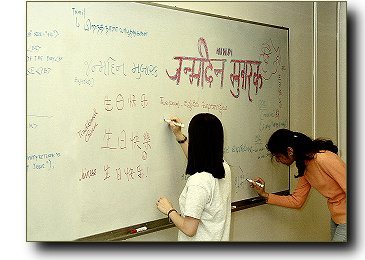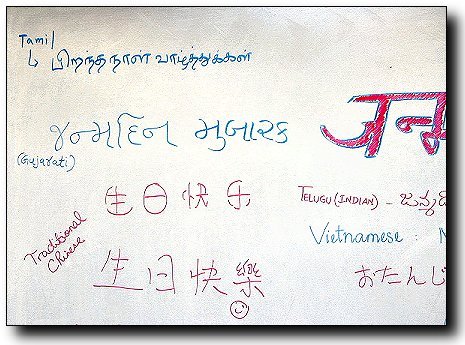 You’re just like a communist!
You’re just like a communist!
 You’re just like a communist!
You’re just like a communist!
Jesse M. Heines
University of Massachusetts Lowell
The roster scared me to death: Rekha Anur. Arvind Balasubramaniam. Samip Banker. Gaurav Bhardwaj. Vibhuvardhan Bontala. Shefali Chandila. Pawankumar Deshpande. Svitlana Grankovska. Jian Gu. Swati Gupta. Parameshwar Hedge. Chetan Jain. Shashidhar Kadiri. Henry Kostowski. Vaishali Kulkarni. Guangyi Li. Yanhe Li. Rambabu Manchikalapudi. Padmanabhan Muthuvelraj. Ngoc Nguyen. Yutaka Onizuka. Ashish Patel. Bhuwan Patel. Daniel Shea (did he register for the wrong class?!?). Wenhua Shi. Lan Shu. Ronald So. Hongwu Su. Samrajya Tatineni. Biao Yang. And Stanphenie Yao.
Whew! Now, I knew that a few of these students were just as American as I am, but the extreme diversity in the overwhelming majority really had me worried. Why? you may rightfully ask. Aren’t international students usually smart and hard-working? Yes, they are, at least in my experience. Aren’t international students usually refreshingly respectful of their professors? Yes, sometimes embarrassingly so. For example, I prefer my students to just call me by my first name, but I find that the small number of international students who accept this usually feel obliged to address me as “Dr. Prof. Mr. Jesse, sir.”
So what’s the problem? Well, the problem is that I love to teach, and I believe that the first step in teaching is engaging students’ interest and attention on a personal level. I therefore constantly illustrate my lectures with real-life examples from my personal experience.
My students will tell you that I am always talking about my wife and kids. My favorite illustration of multitasking in computer operating systems is the way my boys and I would go through the supermarket when they were in high school, each of us a separate “process” heading in different directions to maximize our shopping efficiency and “joining” at the checkout to resynchronize our tasks. Explain interprocess communication? No problem: that’s my wife Bonnie and me doing our shopping alone now that the kids are gone, still going our separate ways, but now with walkie-talkies!
To me, each class is a performance. Over the years some students have loved my classes and some have hated them, but I daresay very few have slept through them. How would these international students, whose life experiences were so different from my own, react to my approach? Would they “get” my jokes? Would they respond to my personal anecdotes? Would my style confuse rather than stimulate them?
I had had my share of interaction with international students before this class, most of it absolutely marvelous, enriching my life as much as it has hopefully enriched theirs. For example, as a teacher of programming, students often come to my office for one-on-one help when they are doing their assignments and come up against bugs or difficult algorithms they can’t figure out for themselves. Nadeem Chaudry, from Pakistan, had a particularly tricky bug that we worked on together for about half an hour to no avail. At that point I said, “Nadeem, this is a two-cookie problem!”
 Of course Nadeem had no idea
what I was talking about, but I opened the drawer containing my chocolate chip
cookie stash, took one for myself, and offered him one. “Thank you,” he
said, “but my religion probably doesn’t allow me to eat those.”
Of course Nadeem had no idea
what I was talking about, but I opened the drawer containing my chocolate chip
cookie stash, took one for myself, and offered him one. “Thank you,” he
said, “but my religion probably doesn’t allow me to eat those.”
“What religion is that?” I asked.
“Muslim,” he answered, but at the same time he looked at the cookie bag more closely. “Wait,” he said, “these are kosher. See? They have a U in a circle, which means that they’re OK for Jews to eat. Our dietary laws are very similar, so I think it’s probably OK for me to have one after all.”
“That’s fascinating,” I said. “I’m Jewish, but I never knew about that similarity in our religions.”
Nadeem pushed back hard from the desk at which we were working. “What?!” he gasped. “You’re a Jew?!?”
“Yes,” I replied calmly.
“But then why are you helping me?”
Now it was my turn to be surprised. “Why am I helping you?” I repeated incredulously. “Because I’m the professor and you’re the student.” The poor man was speechless. I can’t even remember if we solved his programming problem or not, but I do remember him leaving my office a short time later, shaking his head as he wrestled with the realization that a Jew had been willing to help him.
A few years later I had another Pakistani student in my class, Omar Hoda. We became friendly because he shot golf in the 70s and offered to give me a few pointers. Omar also house-sat for me a couple of times when I was traveling. He had told me that he was a friend of Nadeem’s, but somehow the incident described above never came up in our conversations.
By this time, Nadeem had graduated. Then one day out of the blue I got an invitation to his wedding. I didn’t know what to wear or how to behave at a Muslim wedding, so I asked Omar for some advice. I also told Omar that while I was of course delighted to be invited to the wedding, I was also amazed that Nadeem would include me in such an important event in his life. “Why?” Omar questioned. “You changed his life.”
He then proceeded to tell me the profound effect the little episode in my office with the kosher chocolate chip cookies had had on his friend, changing not only his attitude toward Jews, of course, but also his attitude toward all people different from himself. It seems that by simply helping him tackle a computer problem and treating him with respect, I had unknowingly helped him see beyond the prejudices of his upbringing and inspired him to respect all his fellow men.
I wasn’t at all confident that I would have such luck with a class of 31 highly diverse students, and thus I faced my first class with trepidation. But with the very first assignment, I saw that something special was happening: 31 students, 31 programs handed in. The second assignment: again 31 programs handed in. As the semester went on some students faltered a bit and turned in assignments late, but as we near the end of the semester we have now had eight assignments due and all students but one have handed all eight in.
 About half way through the semester my wife Bonnie showed up in class on my birthday with
a cake big enough for everyone. Not only did the students enjoy the cake, but they
filled the board with “Happy Birthday” in all their native languages.
(Some wise guys wrote HTML and Java code on the board to display “Happy
Birthday” when run, saying we couldn’t ignore those languages, either!)
About half way through the semester my wife Bonnie showed up in class on my birthday with
a cake big enough for everyone. Not only did the students enjoy the cake, but they
filled the board with “Happy Birthday” in all their native languages.
(Some wise guys wrote HTML and Java code on the board to display “Happy
Birthday” when run, saying we couldn’t ignore those languages, either!)
But the most amazing incident happened one day when I had set up for class a bit early and went up to two Chinese students chatting in Mandarin and asked them what they were talking about. “We were talking about you,” Guangyi Li said with a big smile.
“Oh?” I replied. “And just what were you saying?” I asked, smiling back and hoping for the best.
“That you’re just like a communist!” she exclaimed.
Yeow, that really set me back! I thought she was kidding. “What?” I asked, trying to maintain my smile. “How so?”
“Because of your ... enthusiasm,” she explained, looking to classmate Hongwu Su for assistance in finding just the right word. “In the old days, the communists were just like you. Always full of enthusiasm and excitement for what they were doing.”
Wenhua (Michelle) Shi, another student from the People’s Republic of China added, “Your definition of a communist is totally different from in my country. I am not a communist, but ‘communist’ is the best and the most beautiful word in my country. Its definition is a person who is in the Communist Party, believes that the world consists of material things and was not created by God, serves people without reservation, is hard working and enthusiastic, and is very, very selfless. I do not blame you for having a wrong image about communists, because your society is capitalist, and your country’s press always reports news about the bad parts of China.”
So there you have it. “Just like a communist.” A compliment, not an insult. Cultural diversity sure keeps things interesting!
Jesse M. Heines is a Professor Emeritus of Computer Science at the University of Massachusetts Lowell. His e-mail address is heines@cs.uml.edu.
A slightly modified version of this article was published as a Letter to the Editor in the Winter 2001-2002 issue of Thought and Action, the National Education Association Journal of Higher Education (p. 139).
This version was updated at .